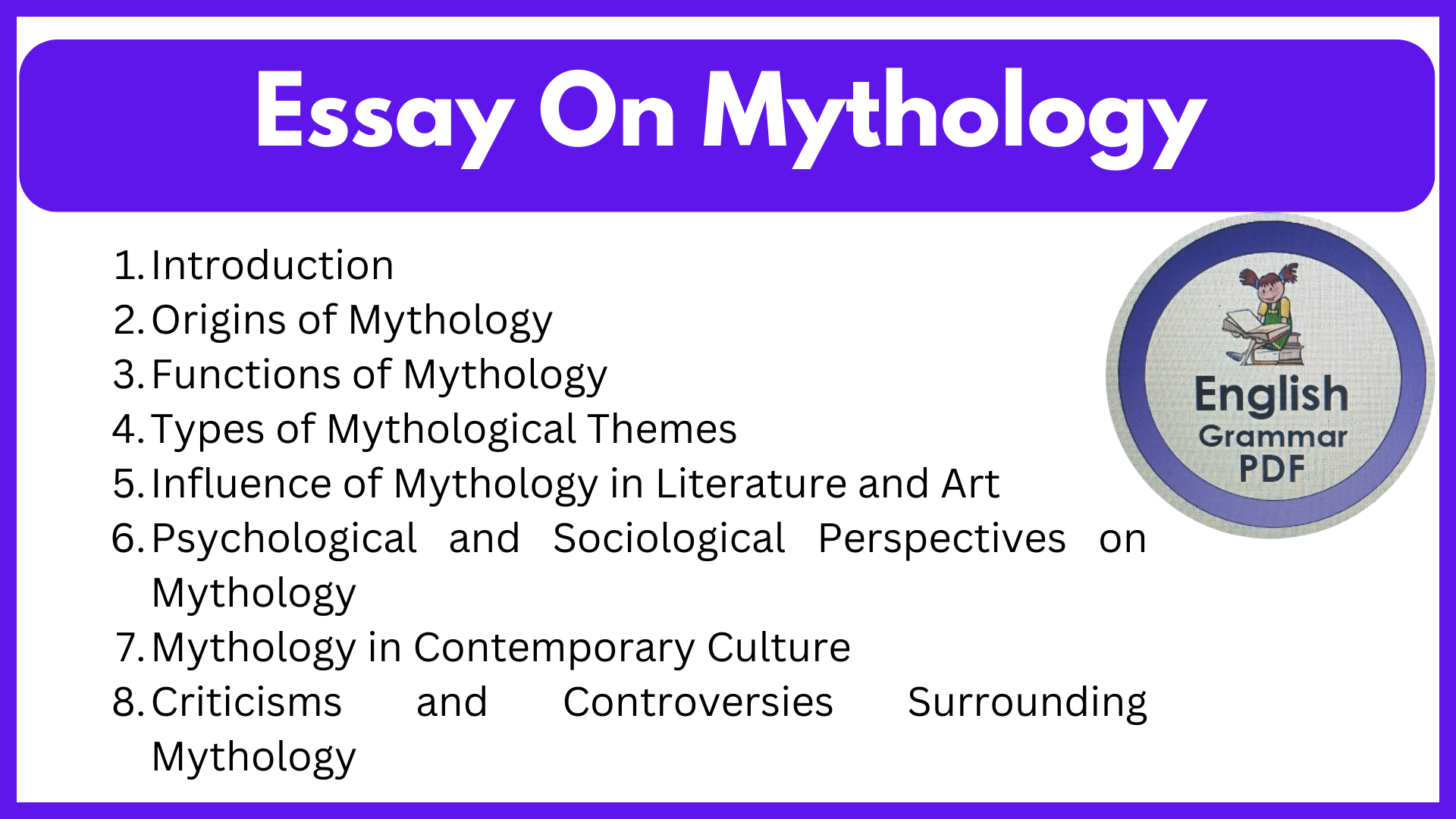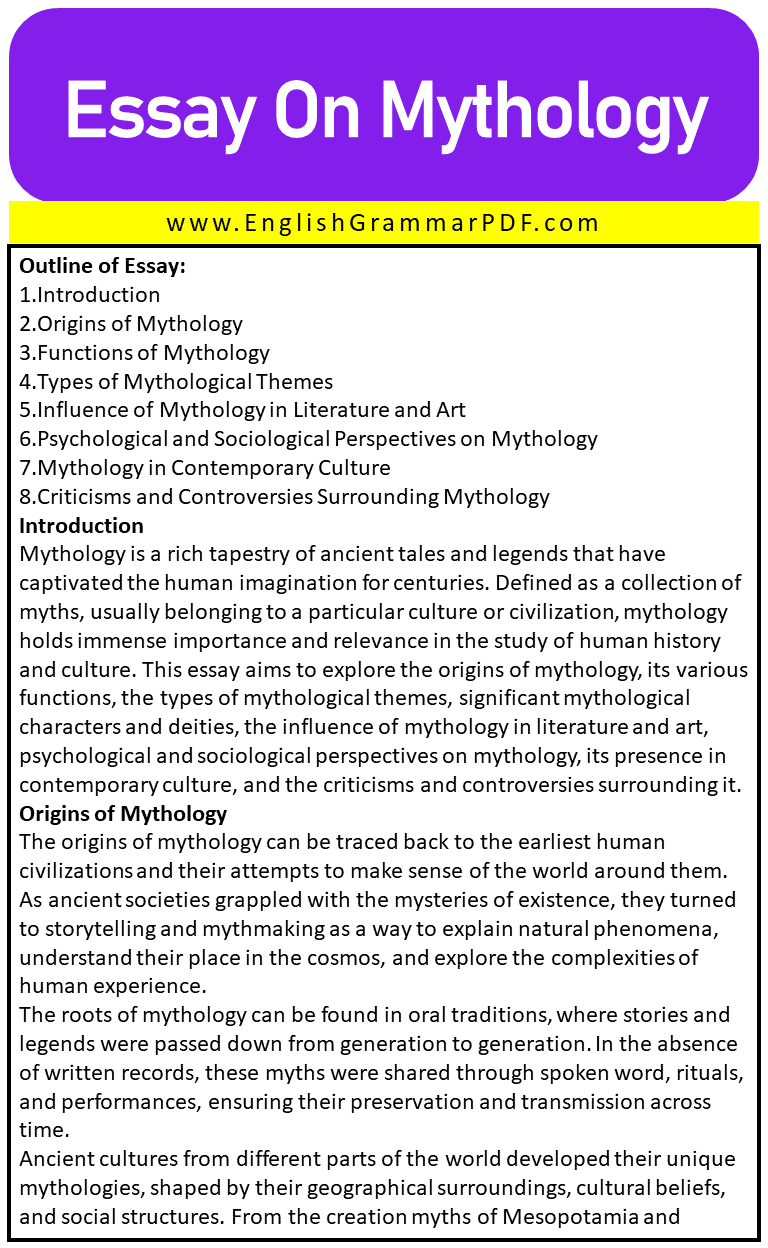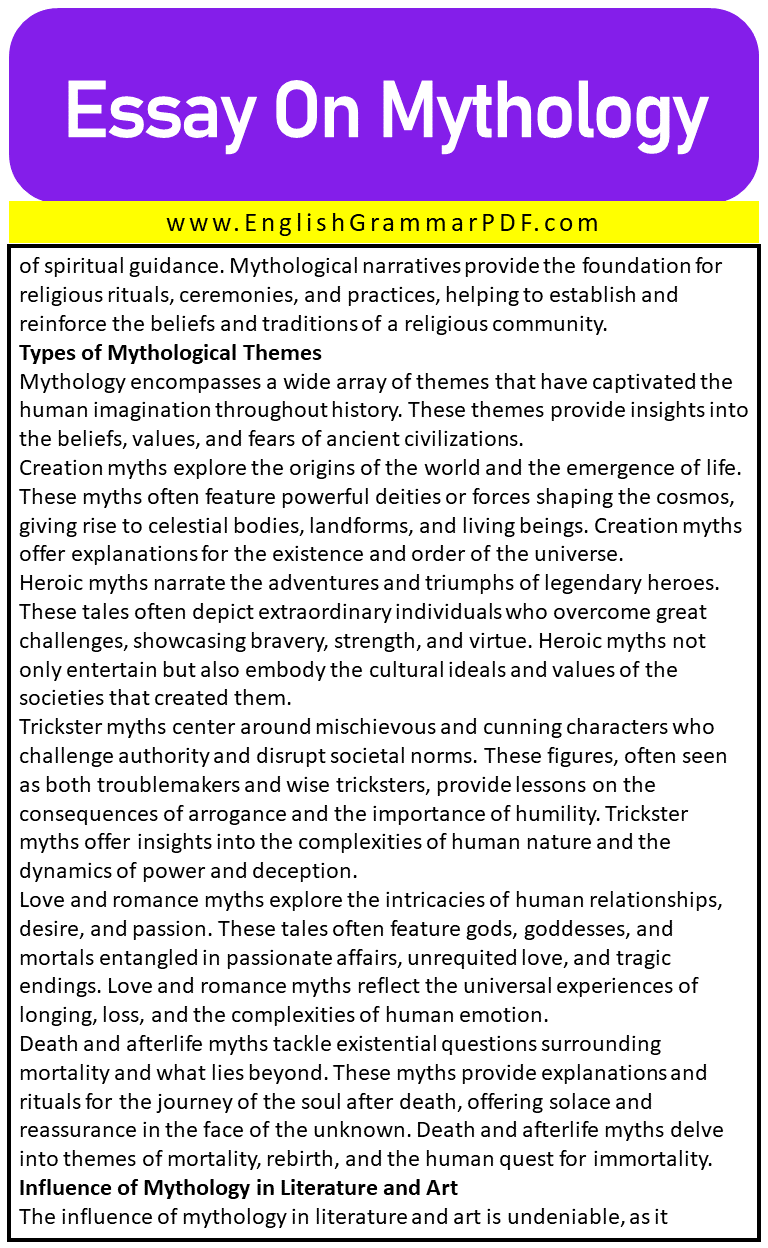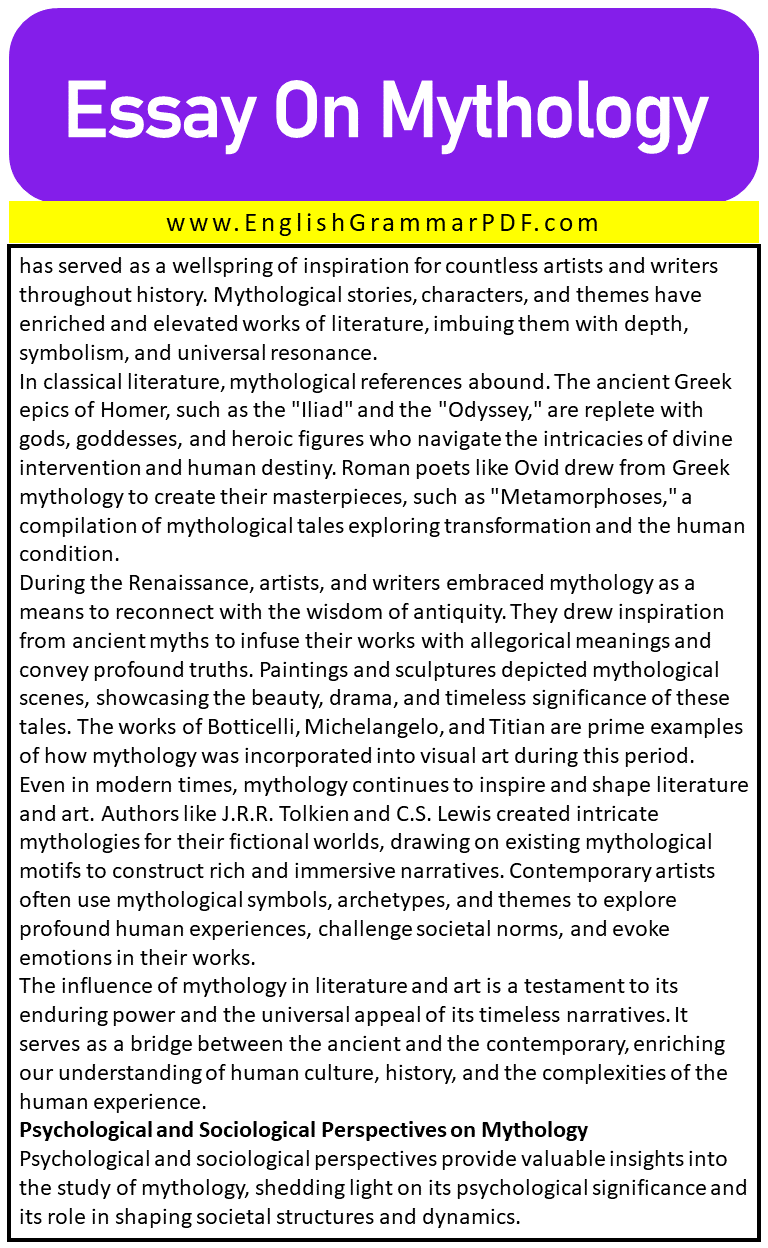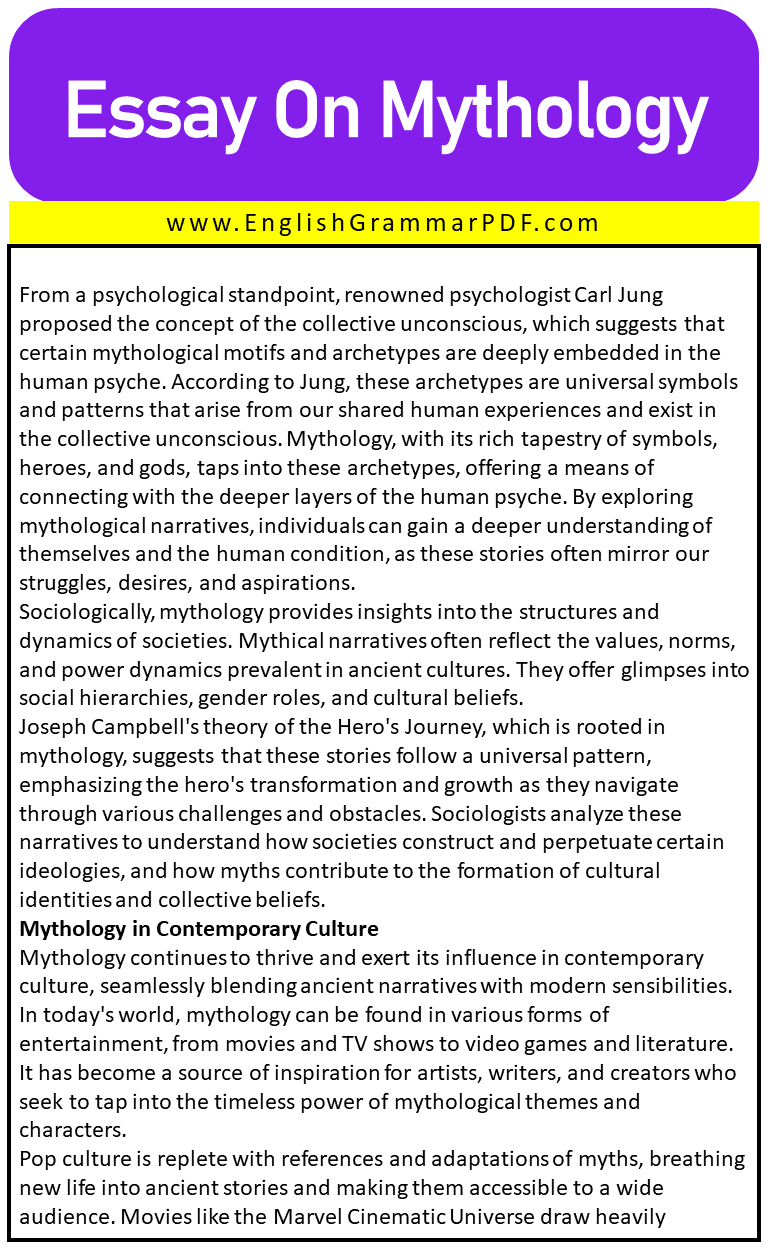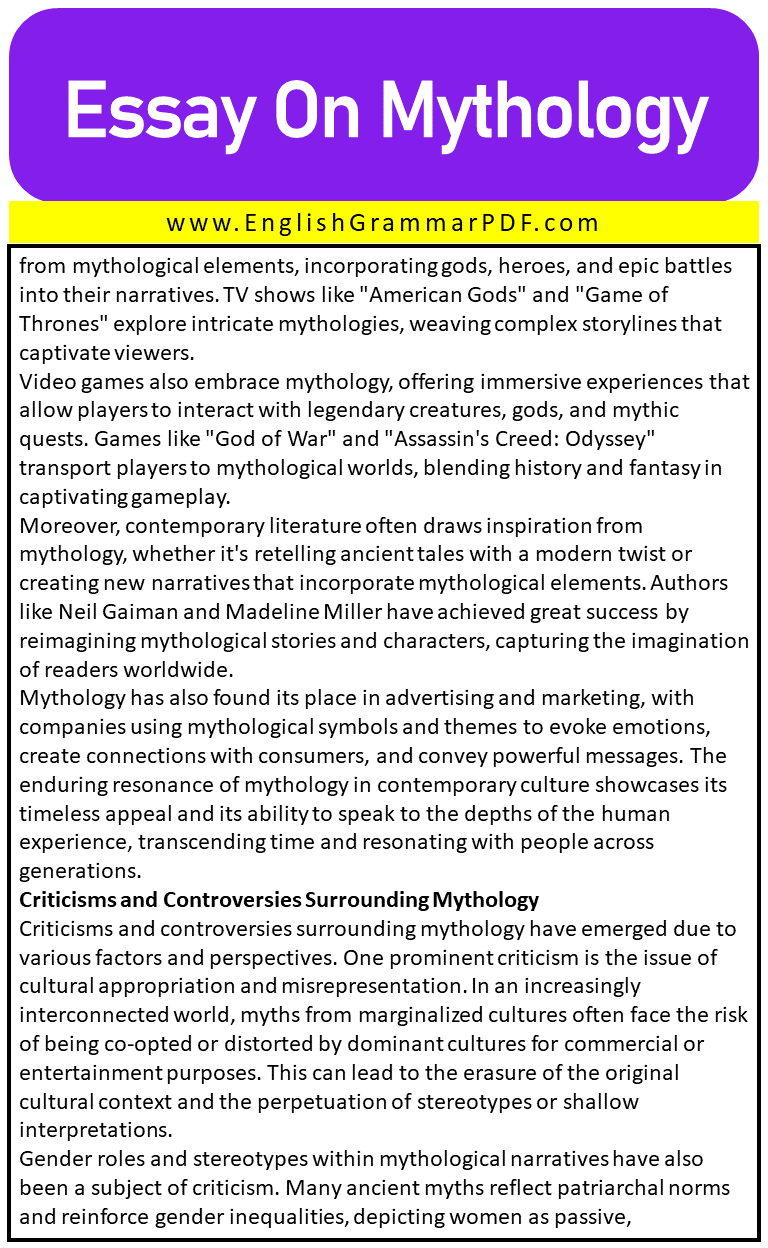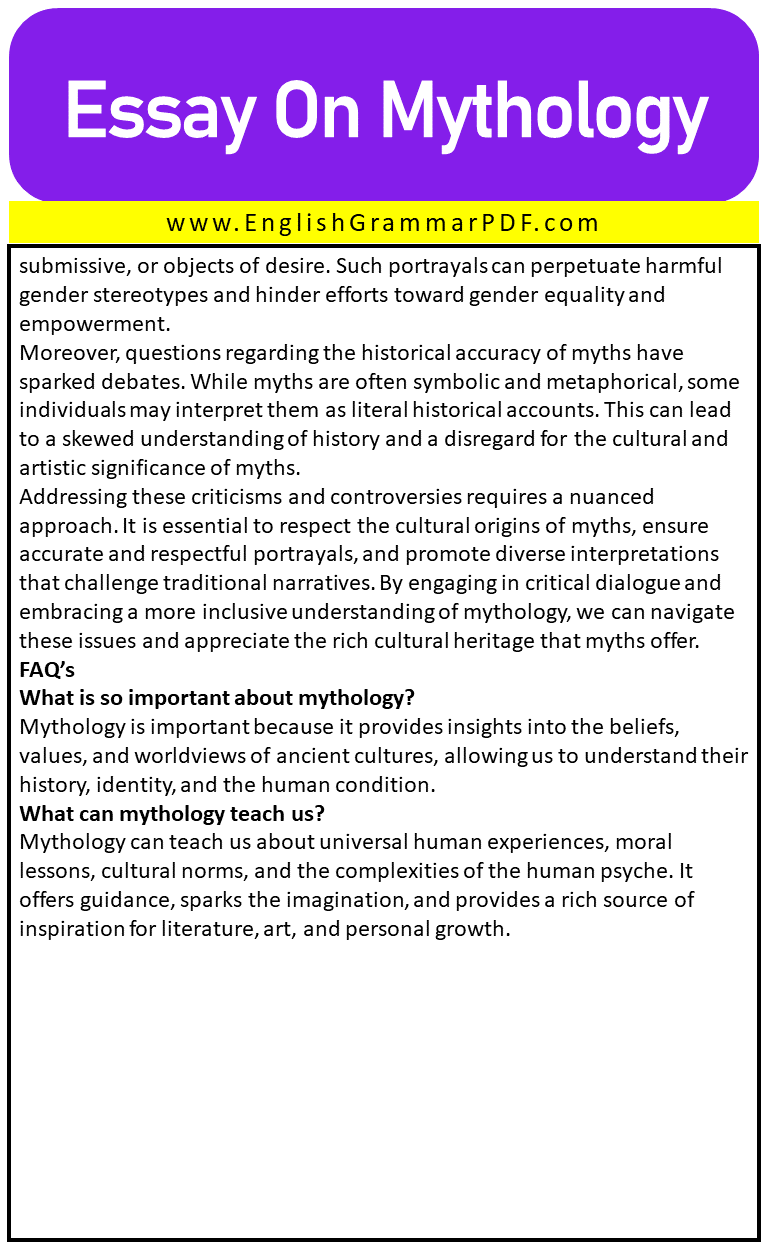Essay On Mythology
Outline of Essay:
- Introduction
- Origins of Mythology
- Functions of Mythology
- Types of Mythological Themes
- Influence of Mythology in Literature and Art
- Psychological and Sociological Perspectives on Mythology
- Mythology in Contemporary Culture
- Criticisms and Controversies Surrounding Mythology
Introduction
Mythology is a rich tapestry of ancient tales and legends that have captivated the human imagination for centuries. Defined as a collection of myths, usually belonging to a particular culture or civilization, mythology holds immense importance and relevance in the study of human history and culture. This essay aims to explore the origins of mythology, its various functions, the types of mythological themes, significant mythological characters and deities, the influence of mythology in literature and art, psychological and sociological perspectives on mythology, its presence in contemporary culture, and the criticisms and controversies surrounding it.
Origins of Mythology
The origins of mythology can be traced back to the earliest human civilizations and their attempts to make sense of the world around them. As ancient societies grappled with the mysteries of existence, they turned to storytelling and mythmaking as a way to explain natural phenomena, understand their place in the cosmos, and explore the complexities of human experience.
The roots of mythology can be found in oral traditions, where stories and legends were passed down from generation to generation. In the absence of written records, these myths were shared through spoken word, rituals, and performances, ensuring their preservation and transmission across time.
Ancient cultures from different parts of the world developed their unique mythologies, shaped by their geographical surroundings, cultural beliefs, and social structures. From the creation myths of Mesopotamia and Egypt to the heroic tales of ancient Greece and the rich pantheon of gods in Hinduism, each civilization wove intricate narratives to make sense of their origins, customs, and moral codes.
The role of mythology in early human societies extended beyond mere storytelling. It served as a means of reinforcing cultural values, providing moral guidance, and establishing a shared identity among members of a community. Through myths, ancient civilizations sought to understand the natural world, interpret the divine, and grapple with fundamental questions about life, death, and the human condition.
Functions of Mythology
Mythology serves several important functions within human societies. Firstly, mythology provides explanations for natural phenomena that early civilizations struggled to understand. Through myths, ancient cultures sought to make sense of the origins of the world, the cycles of nature, and the forces governing the universe. These narratives provided a sense of order and meaning in the face of the unknown, offering a framework for understanding the complexities of the natural world.
Secondly, mythology plays a crucial role in establishing cultural values and norms. Myths often portray idealized behaviors and serve as moral compasses, illustrating the consequences of deviating from societal expectations. By showcasing the virtues of bravery, loyalty, justice, and humility, myths imparted cultural values and norms, helping to shape the ethical frameworks of ancient societies.
Furthermore, mythology provides moral guidance by presenting narratives that explore the complexities of human behavior and the consequences of one’s actions. Through mythological tales, individuals are offered moral lessons and insights into the consequences of greed, deceit, or hubris. These stories serve as cautionary tales, teaching individuals about the importance of ethical conduct and the potential pitfalls of immoral behavior.
Lastly, mythology plays a pivotal role in shaping religious beliefs and practices. Myths often feature gods, goddesses, and supernatural beings who are worshipped and revered. These divine figures embody certain qualities and powers, serving as objects of devotion and sources of spiritual guidance. Mythological narratives provide the foundation for religious rituals, ceremonies, and practices, helping to establish and reinforce the beliefs and traditions of a religious community.
Types of Mythological Themes
Mythology encompasses a wide array of themes that have captivated the human imagination throughout history. These themes provide insights into the beliefs, values, and fears of ancient civilizations.
Creation myths explore the origins of the world and the emergence of life. These myths often feature powerful deities or forces shaping the cosmos, giving rise to celestial bodies, landforms, and living beings. Creation myths offer explanations for the existence and order of the universe.
Heroic myths narrate the adventures and triumphs of legendary heroes. These tales often depict extraordinary individuals who overcome great challenges, showcasing bravery, strength, and virtue. Heroic myths not only entertain but also embody the cultural ideals and values of the societies that created them.
Trickster myths center around mischievous and cunning characters who challenge authority and disrupt societal norms. These figures, often seen as both troublemakers and wise tricksters, provide lessons on the consequences of arrogance and the importance of humility. Trickster myths offer insights into the complexities of human nature and the dynamics of power and deception.
Love and romance myths explore the intricacies of human relationships, desire, and passion. These tales often feature gods, goddesses, and mortals entangled in passionate affairs, unrequited love, and tragic endings. Love and romance myths reflect the universal experiences of longing, loss, and the complexities of human emotion.
Death and afterlife myths tackle existential questions surrounding mortality and what lies beyond. These myths provide explanations and rituals for the journey of the soul after death, offering solace and reassurance in the face of the unknown. Death and afterlife myths delve into themes of mortality, rebirth, and the human quest for immortality.
Influence of Mythology in Literature and Art
The influence of mythology in literature and art is undeniable, as it has served as a wellspring of inspiration for countless artists and writers throughout history. Mythological stories, characters, and themes have enriched and elevated works of literature, imbuing them with depth, symbolism, and universal resonance.
In classical literature, mythological references abound. The ancient Greek epics of Homer, such as the “Iliad” and the “Odyssey,” are replete with gods, goddesses, and heroic figures who navigate the intricacies of divine intervention and human destiny. Roman poets like Ovid drew from Greek mythology to create their masterpieces, such as “Metamorphoses,” a compilation of mythological tales exploring transformation and the human condition.
During the Renaissance, artists, and writers embraced mythology as a means to reconnect with the wisdom of antiquity. They drew inspiration from ancient myths to infuse their works with allegorical meanings and convey profound truths. Paintings and sculptures depicted mythological scenes, showcasing the beauty, drama, and timeless significance of these tales. The works of Botticelli, Michelangelo, and Titian are prime examples of how mythology was incorporated into visual art during this period.
Even in modern times, mythology continues to inspire and shape literature and art. Authors like J.R.R. Tolkien and C.S. Lewis created intricate mythologies for their fictional worlds, drawing on existing mythological motifs to construct rich and immersive narratives. Contemporary artists often use mythological symbols, archetypes, and themes to explore profound human experiences, challenge societal norms, and evoke emotions in their works.
The influence of mythology in literature and art is a testament to its enduring power and the universal appeal of its timeless narratives. It serves as a bridge between the ancient and the contemporary, enriching our understanding of human culture, history, and the complexities of the human experience.
Psychological and Sociological Perspectives on Mythology
Psychological and sociological perspectives provide valuable insights into the study of mythology, shedding light on its psychological significance and its role in shaping societal structures and dynamics.
From a psychological standpoint, renowned psychologist Carl Jung proposed the concept of the collective unconscious, which suggests that certain mythological motifs and archetypes are deeply embedded in the human psyche. According to Jung, these archetypes are universal symbols and patterns that arise from our shared human experiences and exist in the collective unconscious. Mythology, with its rich tapestry of symbols, heroes, and gods, taps into these archetypes, offering a means of connecting with the deeper layers of the human psyche. By exploring mythological narratives, individuals can gain a deeper understanding of themselves and the human condition, as these stories often mirror our struggles, desires, and aspirations.
Sociologically, mythology provides insights into the structures and dynamics of societies. Mythical narratives often reflect the values, norms, and power dynamics prevalent in ancient cultures. They offer glimpses into social hierarchies, gender roles, and cultural beliefs.
Joseph Campbell’s theory of the Hero’s Journey, which is rooted in mythology, suggests that these stories follow a universal pattern, emphasizing the hero’s transformation and growth as they navigate through various challenges and obstacles. Sociologists analyze these narratives to understand how societies construct and perpetuate certain ideologies, and how myths contribute to the formation of cultural identities and collective beliefs.
Mythology in Contemporary Culture
Mythology continues to thrive and exert its influence in contemporary culture, seamlessly blending ancient narratives with modern sensibilities. In today’s world, mythology can be found in various forms of entertainment, from movies and TV shows to video games and literature. It has become a source of inspiration for artists, writers, and creators who seek to tap into the timeless power of mythological themes and characters.
Pop culture is replete with references and adaptations of myths, breathing new life into ancient stories and making them accessible to a wide audience. Movies like the Marvel Cinematic Universe draw heavily from mythological elements, incorporating gods, heroes, and epic battles into their narratives. TV shows like “American Gods” and “Game of Thrones” explore intricate mythologies, weaving complex storylines that captivate viewers.
Video games also embrace mythology, offering immersive experiences that allow players to interact with legendary creatures, gods, and mythic quests. Games like “God of War” and “Assassin’s Creed: Odyssey” transport players to mythological worlds, blending history and fantasy in captivating gameplay.
Moreover, contemporary literature often draws inspiration from mythology, whether it’s retelling ancient tales with a modern twist or creating new narratives that incorporate mythological elements. Authors like Neil Gaiman and Madeline Miller have achieved great success by reimagining mythological stories and characters, capturing the imagination of readers worldwide.
Mythology has also found its place in advertising and marketing, with companies using mythological symbols and themes to evoke emotions, create connections with consumers, and convey powerful messages. The enduring resonance of mythology in contemporary culture showcases its timeless appeal and its ability to speak to the depths of the human experience, transcending time and resonating with people across generations.
Criticisms and Controversies Surrounding Mythology
Criticisms and controversies surrounding mythology have emerged due to various factors and perspectives. One prominent criticism is the issue of cultural appropriation and misrepresentation. In an increasingly interconnected world, myths from marginalized cultures often face the risk of being co-opted or distorted by dominant cultures for commercial or entertainment purposes. This can lead to the erasure of the original cultural context and the perpetuation of stereotypes or shallow interpretations.
Gender roles and stereotypes within mythological narratives have also been a subject of criticism. Many ancient myths reflect patriarchal norms and reinforce gender inequalities, depicting women as passive, submissive, or objects of desire. Such portrayals can perpetuate harmful gender stereotypes and hinder efforts toward gender equality and empowerment.
Moreover, questions regarding the historical accuracy of myths have sparked debates. While myths are often symbolic and metaphorical, some individuals may interpret them as literal historical accounts. This can lead to a skewed understanding of history and a disregard for the cultural and artistic significance of myths.
Addressing these criticisms and controversies requires a nuanced approach. It is essential to respect the cultural origins of myths, ensure accurate and respectful portrayals, and promote diverse interpretations that challenge traditional narratives. By engaging in critical dialogue and embracing a more inclusive understanding of mythology, we can navigate these issues and appreciate the rich cultural heritage that myths offer.
FAQ’s
What is so important about mythology?
Mythology is important because it provides insights into the beliefs, values, and worldviews of ancient cultures, allowing us to understand their history, identity, and the human condition.
What can mythology teach us?
Mythology can teach us about universal human experiences, moral lessons, cultural norms, and the complexities of the human psyche. It offers guidance, sparks the imagination, and provides a rich source of inspiration for literature, art, and personal growth.
Explore More Essays:
Download the PDF of the Essay:
